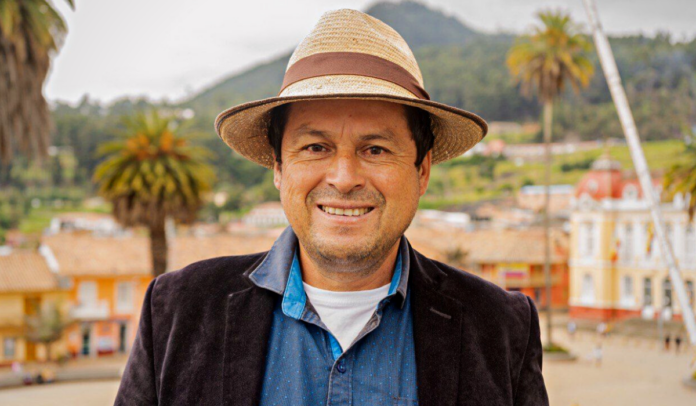These are hours of uncertainty, of media operations, of tensions at the surface. This Sunday, the Colombian people will decide whether, for the first time in its history, it will give way to a progressive government or whether the model will continue disguised with a new face. Polls show a technical tie between Gustavo Petro and the controversial businessman Rodolfo Hernandez. The Historical Pact managed to gather the support of the center-left parties and practically all the expressions of the popular camp, among them the Congress of the Peoples, which positioned peasant leader Robert Daza as senator-elect.
Daza has been defending water, rivers and moorlands for 35 years, fighting against deforestation and fracking in oil exploitation in the department of Nariño, in southwestern Colombia. As a leader of the National Agrarian Coordinator (CNA), he was a victim of forced displacement, persecuted and imprisoned; now it is his turn to bring the voice of the social movement to the institutions. In this interview with ALAI, he analyzes the differences between Petro and Hernández, assures that “we will win by 3 or 4 points” and warns that “the factors of power controlled by Uribism are still intact”. He also highlights the relevance of this election for the future of Latin America and the Caribbean.
Gerardo Szalkowicz -After the results of the first round, there was a certain discouragement in the militancy of the Historical Pact, but then expectations began to rise again due to the improvement in the polls. How do you perceive the scenario for the runoff?
-The first round showed us a dynamic balance of forces, a technical tie as they say. It is true that we aspired to win in the first round, which was an illusion of many members of the Historical Pact, but from the direction of the campaign it was known that it was not possible. However, this hope was allowed to run and this caused a certain impact of surprise and discouragement in our electoral base.
After the results, there was an idea that the votes of Rodolfo (Hernández) and Federico (Gutiérrez) would be automatically added, but the polls are showing that this was not the case, that is to say that this calculation of the right wing is not being translated into a mathematical addition, but other elements came into play.
-What are the elements that led to talk of a technical tie?
-The Historic Pact is doing a job that it did not do in the campaign for the first round, to be a little more realistic and not so triumphalist. There were many people who did not go out to vote or went for a walk and the logistic tuning was not done so that everybody had the opportunity to vote, many sectors of the youth that are not organized did not go out to vote. Many people voted for Rodolfo as an option for change, his speech against corruption caught the attention of many people who were not very clear about his proposal but, as they say, the fish dies by his mouth. His rude language, disqualifying, extremely violent, was liked in some sectors but not in the majority of the population, and also his verbal attack to some institutions such as the Court or the Congress. A series of factors that generate doubts in a part of the electorate that, even if they are not going to vote for Petro, they may abstain.
– What do you think will be the outcome of the upcoming elections?
-I think it will be a very tight election but we will win by 3 or 4 points.
– Do you share the view that Uribism was the great loser of these elections?
-I would not say that. Although it is true that there was a rejection of Uribism, the factors of power controlled by Uribism are still intact: the military forces, most of the media, the business sector, the drug trafficking mafias… there is still the power of Uribism and the ultra-right intact. There was mainly a rejection of the government of Iván Duque, the economic policy and the FTAs that deteriorated food sovereignty, destroyed small businesses and industries and led people to informality, the increase in food prices, insecurity, corruption scandals in the high government. All this generated a malaise and a rejection of the government, which was put in place by Uribism, and this was expressed in the elections.
And it should also be clarified that Petro could have obtained many more votes if it were not for the strong influence of a fear campaign that the media have instilled in the people.
-Rodolfo Hernández has been presenting himself as an outsider who is “neither right nor left”, and has been trying to detach himself from Uribism. Where do you place him ideologically and what do you think would be his relationship with Uribism in case he becomes president?
Rodolfo was not a well-known person in the political world, he was better known in the business world. I place him in the space of the ultra-right, because of his behavior he even has the airs of a dictator. When he says that he is not going to pay attention to the Cortes, to the Congress, that he is going to govern alone, it is an extreme right-wing thought, even fascist.
Surely there will not be a tacit or documented alliance with Uribism, but we cannot expect him to modify the economic model, the FTAs will surely continue to deepen to the detriment of the national economy, to the detriment of peasant agriculture, social programs will surely deteriorate and workers’ rights will be taken away. I see a deepening of the neoliberal economic model.
“Rodolfo, when he says that he will ignore the Cortes, the Congress, that he will govern alone, it is an extreme right-wing thought, even fascist”
-The power of the narco-paramilitaries, often above all other powers, is perhaps the country’s most serious problem and the main challenge for the next government. How do you think both Hernandez and Petro could address it?
-With a Rodolfo government there would be no confrontation, but rather there would be the continuity of the power of the drug trafficking mafias. On the other hand, Petro’s program proposes to initiate a route and seek agreements with the sectors involved, to begin to resolve this issue, with concrete proposals such as providing the peasantry with alternatives to the planting of coca leaves or the regularization of marijuana.
-Many of us understand the irruption of Francia Marquez as the most novel and disruptive element in this electoral process. What does her figure imply and what does she bring to the project of the Historical Pact?
-I believe that if Petro has good chances of reaching the presidency it is precisely because of the presence of Francia Márquez. Francia represents that vote of political conscience and social conscience, it is not a vote for a person but for a project of transformation of the country, for environmentalism, for the rights of women and diversities, for the peasantry. That is to say, it is a programmatic, political, even ideological vote; France is the figure that we will surely continue to nurture from the social organizations for a future presidency.
-Colombia has been for more than a century the main point of support of the United States in Latin America. In that sense, what do you think is the importance of these elections for the region and how do you imagine the foreign policy of both candidates?
-Yes, Colombia plays a leading role in the Latin American context. I believe that if we manage to win with Gustavo Petro, we will surely contribute to consolidate the block of alternative governments, to join efforts for Latin American integration. The relationship with the U.S. will not change 180 degrees but neither will we be its main ally. In addition, the relationship with Venezuela will be reestablished and Colombia would cease to be the main support of the US in the region, it would cease to be the main ally of imperialism to overthrow the government of Maduro. We would then have greater levels of autonomy and self-determination.
Grassroots organisations and government in Latin America: the Colombian hope
With Hernández there would be continuity: this relationship with the United States would be maintained and we would continue to be the spearhead of imperialist domination in Latin America.
-What will be your objective as senator, taking into account that you represent a group of social organizations?
-Whatever the result, as senator of the Republic I will continue to lead social struggles. We have to continue fighting in the streets, building popular power, building social organization, popular economy; that is our work and we are going to reach the institutions to try to get some instruments to support those struggles.








